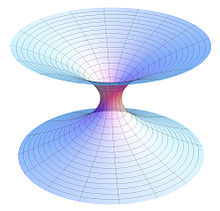
Back Teoretiese fisika Afrikaans فيزياء نظرية Arabic Física teórica AST Nəzəri fizika Azerbaijani Тэарэтычная фізіка Byelorussian Тэарэтычная фізыка BE-X-OLD Теоретична физика Bulgarian सैद्धांतिक भौतिकी Bihari তাত্ত্বিক পদার্থবিজ্ঞান Bengali/Bangla Fizik teorikel Breton

Theoretical physics is a branch of physics that employs mathematical models and abstractions of physical objects and systems to rationalize, explain, and predict natural phenomena. This is in contrast to experimental physics, which uses experimental tools to probe these phenomena.
The advancement of science generally depends on the interplay between experimental studies and theory. In some cases, theoretical physics adheres to standards of mathematical rigour while giving little weight to experiments and observations.[a] For example, while developing special relativity, Albert Einstein was concerned with the Lorentz transformation which left Maxwell's equations invariant, but was apparently uninterested in the Michelson–Morley experiment on Earth's drift through a luminiferous aether.[1] Conversely, Einstein was awarded the Nobel Prize for explaining the photoelectric effect, previously an experimental result lacking a theoretical formulation.[2]
Cite error: There are <ref group=lower-alpha> tags or {{efn}} templates on this page, but the references will not show without a {{reflist|group=lower-alpha}} template or {{notelist}} template (see the help page).
- ^ van Dongen, Jeroen (2009). "On the role of the Michelson-Morley experiment: Einstein in Chicago". Archive for History of Exact Sciences. 63 (6): 655–663. arXiv:0908.1545. doi:10.1007/s00407-009-0050-5.
- ^ "The Nobel Prize in Physics 1921". The Nobel Foundation. Retrieved 2008-10-09.